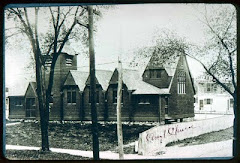“Peace on earth, good-will toward men.”
These are difficult words to proclaim at Christmas, particularly when the world is filled with such hatred.
In his book, Evil and the Justice of God, Anglican Bishop N.T. Wright appraises the conflict in the Middle East, and offers a reason why it remains unresolved. He states that for many, forgiveness is neither a duty nor a virtue, but a kind of “moral weakness.” The main moral standard guiding those who perpetuate the conflict is justice, which demands vengeance. Wright states, “It’s not just that they don’t want to forgive or that they find it difficult. They believe passionately that it would be immoral, totally wrong.”
I’ve seen first-hand such unrelenting conflict. Matters will only be “resolved” when the opposing faction is wiped out--so many claim. I sometimes think it will have to involve an army of chaplains to change matters. If we can live at peace with God, we can learn to live at peace with others. Forgiveness takes sin seriously, but aims at reconciliation. It works to resolve conflict, not perpetuate it.
A favorite non-traditional Christmas song I enjoy singing is Christmas in the Trenches by John McCutcheon, which tells the true story of Brits and Germans celebrating a Christmas Eve truce during World War I. They joined together in no-man’s land and sang carols, shared some food and drink, and played soccer…then the next day went on with the business of waging war. This is the sad evidence of living in a fallen world in need of redemption.
Jesus came to face evil and destroy its power on the cross. In self-sacrificing love, He took our place that we might have His peace. He did for us what we cannot do for ourselves. The cross was a symbol of Rome’s imperial might--where Caesar did his worst, but the Cross has become a symbol of God’s love. It is the place where, and the means by which, God demonstrated the power of love and pardon. Such power produces peace. “When will we ever learn?”
In his best-selling book, The Year of Living Biblically, A.J. Jacobs describes how he was challenged by the Apostle Paul’s command to not keep a “record of wrongs” in the Love Chapter, I Corinthians 13. Jacobs stated that in his compulsive manner he kept a log of wrongs in his Palm Treo, especially things his wife did…and when he showed it to his wife, she laughed at him. He admitted this was pathetic, but A.J. is like a lot of people. At least he saw that this practice was unhealthy and unhelpful. If we keep a record of wrongs and keep people under our wrath till each matter is dealt with, we will find that we’re not able to open our hearts to receive God’s forgiveness.
Forgiveness releases not only the person who is being forgiven but the person who is doing the forgiving. Forgiveness is giving up hope that the past could be different. When we forgive, we in no way change the past, but we sure do change the future. We release those who’ve hurt us and we release ourselves from crippling, self-inflicted bitterness. Wright says that forgiveness means that “we shall not allow this evil to determine the sort of people we shall then become.” Let’s pray this Christmas for peace in our troubled world, and ask God what we can do to be His instruments of peace.
A La Carte (January 27)
12 hours ago







No comments:
Post a Comment